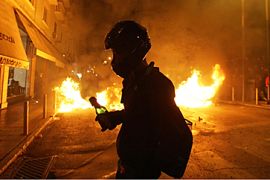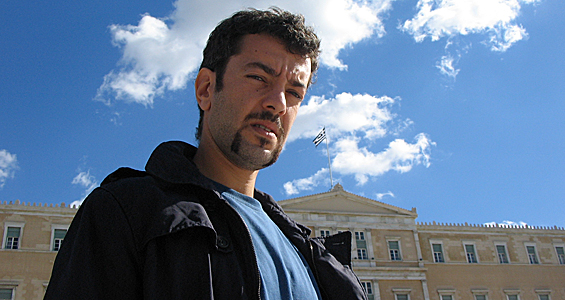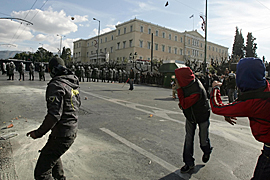Greece’s jobless youths fight back
As unemployment increases, many blame policies that discriminate against youth.

 |
| Despite his many qualifications, Marios Kokkoris is now looking for work in a bar for $65 a day |
Europeans who worry that growing unemployment will lead to social unrest in the months ahead have a familiar mantra these days: “look at what just happened in Greece, that could be a foretaste of what we can all expect in 2009”.
In December last year, thousands of young people in cities across Greece rioted for several days, destroying shops, banks and cars, and attacked policemen.
Keep reading
list of 4 itemsBoeing hit with 32 whistleblower claims, as dead worker’s case reviewed
US imposes new sanctions on Iran after attack on Israel
A flash flood and a quiet sale highlight India’s Sikkim’s hydro problems
The immediate cause of unrest was the killing of a teenage boy by a policeman, but the riots exposed a deep rage and frustration among many young Greeks, some of whom say they are pessimistic about their future.
| In depth |
 |
|
|
Marios Kokkoris, an unemployed university graduate, sees a link between the riots in Greece and the lack of job opportunities.
Though Marios, 28, believes that much of the vandalism and looting during the riots is “shameful”, he is also “glad that people protested, even if it doesn’t change anything”.
Marios said: “The market in Greece is small, and closed; if you don’t know someone, it’s hard, and it’s the same in the public and private sector.”
Marios, who has undergraduate and postgraduate degrees in environmental sciences from the UK, lives at home in Athens with his parents, and doesn’t own a car or motorbike.
“Partially for environmental reasons, but also partially for economic reasons,” he said.
He is now looking for work in a bar, where he hopes he can earn $65 a day.
‘Institutional bias’
 |
| Many young people who rioted said the Greek economy only protected the lucky ones [AFP] |
During the December riots, protesters complained that Greece possessed an inflexible economy that protected those with existing jobs, but discriminated against young talent.
According to Nikos Koutsiaras, a political scientist at the University of Athens, Greece suffers from “an institutional bias against those who enter the labour force”.
However, official statistics appear to indicate that Greece’s unemployment situation may not be as acute.
According to the European Union, 7.5 per cent of Greeks were unemployed in late 2008.
That is near the average unemployment rate for the 27 EU member countries, and slightly better than the average for the 15 euro zone countries.
What these statistics do not reveal, however, is that 20 per cent of Greeks under the age of 25 are unemployed, and the situation is especially difficult for young women.
Storm clouds
Koutsiaras says that “in a time of crisis the figures tend to underestimate the problem” because they do not reveal the number of Greeks who depend on irregular and casual employment, often in the tourism sector, and who are among the first to be laid off.
People who live in this informal economy do not pay taxes, but are unable to claim any social security benefits in times of need.
Greece’s small, and relatively isolated economy, has not yet felt the worst of the financial crisis, but Koutsiaras fears the situation “will worsen as Greece enters the storm”.
The real test will be this summer, when Greece is bracing itself for a sharp drop in tourist numbers.
Marios may not be around by then. He says he has had enough, and has decided to try and look for work opportunities abroad.
“The government should start thinking of young people, but I don’t think it’s going to be easy here in the short term. There won’t be any changes in Greece until we change the way we think”.
